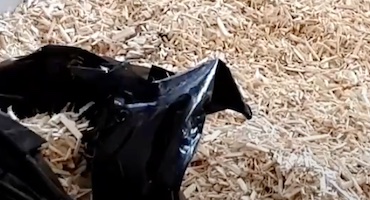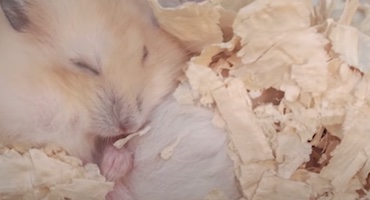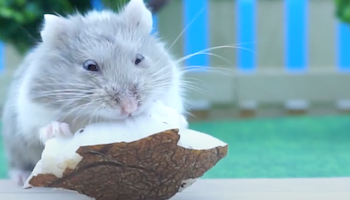Hamsters can make great furry pets for people who love having a little pet to take care of. When it comes to taking care of your little hamsters, there are a few essential things you should know about what you can feed them and what you cannot. If you are wondering ‘can hamsters eat kiwi’? Then the answer is Yes! Hamsters can eat kiwi.
If you are planning on introducing kiwi into your little hamsters’ diet, then there are a few essential things you will need to keep in mind first. Just like any other new food that you introduce into their diet, you have to know about a few do’s and don’ts when it comes to kiwi. Here is everything you need to know about feeding your hamsters kiwi!
Syrian Hamsters are slightly more giant and more robust as compared to their Dwarf hamster cousins. If you are wanting to feed kiwi to your Syrian hamsters, then you can give them a small helping of kiwi just once or twice a keep. Be sure to cut up the kiwi into small pieces and remove the skin and seeds before you give them to your hamsters.
Campbell’s Dwarf hamster, as the name suggests, are a species of dwarf hamsters. While all hamsters are prone to developing diabetes and obesity, the dwarf hamsters are smaller, and thus, you need to feed them with more care. It is best not to feed your Dwarf hamsters kiwi. However, you can give them a tiny portion (a paw-sized piece) just once in two weeks.
Winter white dwarf hamsters, like any other dwarf hamsters, are smallest and have a more delicate digestive system. It is best that you do not feed them kiwis unless you just want to try a small piece occasionally (not more than once in two weeks).
Roborovski hamsters are like their Syrian Hamster cousins. You can give them a small piece of kiwi once or twice a week, but avoid overfeeding them this fruit as kiwis are quite watery, sugary and have a high amount of citrus, which can be bad for your hamsters.
Chinese hamsters are also a species of dwarf hamsters. You should avoid feeding them this citrusy fruit, however, once in two or three weeks can be fine as long as you do not give them large pieces of the fruit.
Hamsters can be found living in the wild in different parts of the world. Here, they are mostly scavengers, which means that they hint and pick their foods. Hamsters living in the wild survive primarily on a diet of wild fruits and berries, vegetables, nuts, grains, and seeds. However, they also occasionally eat small insects, frogs, lizards, and other such foods they can scavenge and find.
Domesticated hamsters are best kept on a healthy, well-balanced diet of special hamster foods. You can feed your pet hamsters the occasional fruits, berries, seeds, vegetables, and nuts. However, you should know precisely what foods are allowed for your little furry friends and which ones are not.
Are there any health benefits of feeding your hamsters kiwi?
Kiwi fruits are a soft, green fruit which is very watery and delicious for both humans and their hamster pets. These fruits have Vitamin A, Vitamin C, fibers, antioxidants, carbohydrates, and Vitamin E.
The presence of Vitamin A and Vitamin C in kiwi is very beneficial for the eye and skin health of your hamsters.
Fibers help to keep the digestive health of your hamsters in check, relieving them from constipation and gut problems.
Antioxidants like Flavonoids and Carotenoids protect your hamsters’ body from free radicals and keep various diseases and conditions at bay, even certain kinds of cancers.
The Vitamin E present in kiwis are high for the overall bone health of your hamsters, making them strong and healthy.
Are there any health risks of feeding your hamsters kiwi?
Kiwis naturally have a lot of salt, sugar, water content and even citrus in them. The presence of these compounds can be dangerous for your hamsters’ health if you overfeed this fruit to them. Since hamsters are quite prone to diabetes and obesity, you need to be very careful when giving them kiwis.
The high water content in kiwis can also cause diarrhea in your hamsters, so avoid overfeeding them.
Citrus fruits are in general not good for your hamsters’ health, so the occasional tiny helping of kiwi is the best option if you are planning on feeding this fruit to your little furry friends.
As you already might have noticed, your hamsters also have a habit of hoarding away food in their cages. It is vital that you regularly clean out any uneaten pieces of kiwi from your hamsters’ cage so that the fruit does not rot and cause problems for your hamster.
Can you feed dried kiwi to your hamster?
Dried kiwis are high in sugar and citrus content. It is best not to feed this to your hamsters, as it might cause a variety of problems, such as rotting of the teeth and other kinds of dental issues. The sticky, sweet texture of dried kiwi can also get stuck in the cheek pockets of your hamster which can cause them to choke, so it is best not to feed dried kiwi to your hamsters.
Can you give kiwi seeds and kiwi skin to your hamster?
When you feed kiwis to your hamster, you should always remember to peel the skin and remove the seeds. It is best that you chop up the kiwi into small, comfortable pieces for your hamster. The kiwi seeds are tiny and can cause choking, and the skin might just not be a tasty treat for your hamster.
How many kiwis can you feed your hamster?
As for your Syrian and Roborovski hamsters, a small portion of kiwi fruit once or twice a week is enough to give them a little change of taste. However, when it comes to your Dwarf hamsters, you should avoid feeding them kiwi fruit. If you have to, you can give them a tiny, paw-sized portion of kiwi once every two or three weeks only.
Conclusion
Dwarf hamsters are very tiny and cannot digest everything as quickly as their bigger hamster cousins. Remember not to overfeed your hamsters’ kiwi as it can cause diarrhea, digestive issues, diabetes, and obesity. Keep your hamsters on a healthy diet of exceptional hamster food, and give them the occasional fruits and vegetables as a treat!
Share
Related Posts
When you get a furry little pet hamster home, one of the first things you worry about is [...]
As a pet owner, it might sometimes get confusing trying to figure out what the right kinds of [...]
While all nuts contain some amount of fat and phosphorous, some of them are safe for your hamsters, [...]





